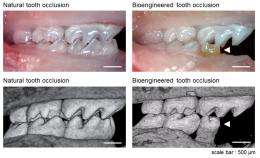July 13, 2011 report
Stem cells grow fully functional new teeth

(Medical Xpress) -- Researchers from Japan recently published a paper in PLoS One describing their successful growth and transplantation of new teeth created from the stem cells of mice.
In order to create these teeth, Takashi Tsuji from Tokyo University of Science and his team removed two different stem cells from the molar teeth of mice. They took these stem cells to grow in the laboratory. In order to control how the teeth grew, as far as shape and length, the stem cells were placed in a mold to grow.
Once the cells grew into full tooth units, the researchers then transplanted them into the jaws of one-month-old mice. These transplanted teeth fused with the jaw bones and tissues on an average of about 40 days. The researchers were also able to detect nerve fibers growing in the new teeth.
The mice that received the transplanted teeth were able to eat and chew normally without any complications.
Tsuji hopes that this new development will help further the research being done to allow for the growth of human organs from a patient’s own stem cells. Currently researchers do not have the ability to culture three-dimensional organs outside of the body. The hope is the growth of these teeth will be the beginning step that is needed.
Tsuji stresses that in order for reparative therapy to be successful, it is important to find the right seed cells. Because the stem cells used for these teeth were taken directly from the molars of the mice, they were able to grow into teeth, complete with enamel and dental bones.
Researchers believe that down the road it may be possible to do this with adult stem cells or cells found in human wisdom teeth and allow for actual teeth to be implanted replacing teeth lost to dental decay or injury.
More information: Oshima M, Mizuno M, Imamura A, Ogawa M, Yasukawa M, et al. (2011) Functional Tooth Regeneration Using a Bioengineered Tooth Unit as a Mature Organ Replacement Regenerative Therapy. PLoS ONE 6(7): e21531. doi:10.1371/journal.pone.0021531
Abstract
Donor organ transplantation is currently an essential therapeutic approach to the replacement of a dysfunctional organ as a result of disease, injury or aging in vivo. Recent progress in the area of regenerative therapy has the potential to lead to bioengineered mature organ replacement in the future. In this proof of concept study, we here report a further development in this regard in which a bioengineered tooth unit comprising mature tooth, periodontal ligament and alveolar bone, was successfully transplanted into a properly-sized bony hole in the alveolar bone through bone integration by recipient bone remodeling in a murine transplantation model system. The bioengineered tooth unit restored enough the alveolar bone in a vertical direction into an extensive bone defect of murine lower jaw. Engrafted bioengineered tooth displayed physiological tooth functions such as mastication, periodontal ligament function for bone remodeling and responsiveness to noxious stimulations. This study thus represents a substantial advance and demonstrates the real potential for bioengineered mature organ replacement as a next generation regenerative therapy.
© 2010 PhysOrg.com














